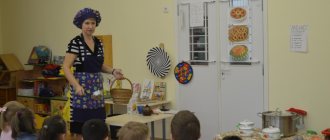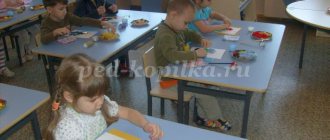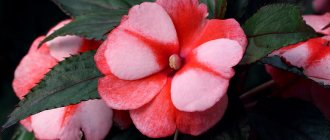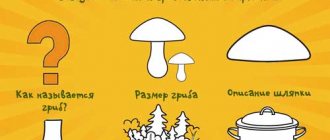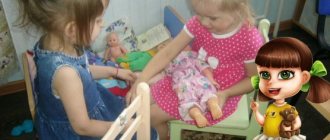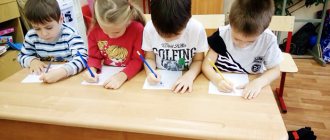Project on the topic: “Pharmacy under your feet”
Type of project: educational.
Project duration: short-term.
Project participants: children of the preparatory group (age 6-7 years), group teachers.
Relevance of the topic:
Environmental education is one of the main directions in the education system; it is a way of influencing children’s feelings, their consciousness, views and ideas. Preschoolers feel the need to communicate with nature. They learn to love it, observe, empathize, understand that our Earth cannot exist without plants, since they not only help us breathe, but also treat us from various diseases. We must protect and preserve them, and be able to correctly use their medicinal properties. Environmental education should be considered, first of all, as moral education. When forming a humane relationship with nature, the main thing is for the preschooler to understand that man and nature are interconnected, therefore caring for nature is caring for man and his future. Talking with children on the topic of plants, we saw that children have an insufficient level of knowledge on the topic “Medicinal plants”. While working with parents, we also discovered that many of them have little understanding of the variety of medicinal plants. Therefore, together with the students and their parents, an environmental project “Medicinal Plants” was developed.
Goal: to create conditions for introducing children to the world of medicinal plants, to form ideas about the role of plants in improving and maintaining human health.
Project objectives:
— consolidate children’s knowledge about the medicinal plants of our region, their medicinal properties;
- ability to distinguish medicinal plants by color and appearance;
— introduce children to the rules of collecting and drying medicinal plants.
— activate the vocabulary: peppermint, yarrow, chamomile, plantain.
— to cultivate communication skills, independence, hard work in preschoolers, as well as respect for nature.
Expected Result:
1. Expanding children's knowledge and understanding of medicinal plants.
2. Rules for collecting and drying medicinal plants.
3. The emergence of interest among parents in the life of a preschool educational institution.
Project implementation stages
Stage 1: preparatory - planning, collecting medicinal plants.
Stage 2: organizational – creating a developmental environment, developing the content of direct educational activities, making a herbarium from plants collected by children.
Stage 3: formative – holding events with children and parents.
Stage 4: final – analysis of the results obtained.
Implementation activities:
Forms of working with children:
Looking at illustrations and paintings of medicinal plants, learning poems and riddles about plants.
Goal: To develop children's cognitive interest in the life of medicinal plants, to develop children's speech, to enrich their vocabulary.
Conversation: “The importance of medicinal plants in human life” Goal: To expand and develop children’s knowledge about medicinal plants, their value for human health.
Reading poems: “Flowers” by A. A. Senkov, “Raspberry” by N. Astakhov, etc.
Learning songs and poems about medicinal plants.
Manual labor:
- modeling: “Miracle - plants” Purpose: to stimulate the child’s imagination and imagination.
— drawing: “Our friend is the plantain” Purpose: to develop children’s creative abilities in drawing plantains.
Coloring pages for children on the theme of plants.
Didactic games “What does this plant heal?”, “Find out by description.”
Mobile folder for parents: “Medicinal plants are under our feet.”
Project outcome
Making a presentation on the topic “Pharmacy under your feet.”
Effectiveness of the project: consciously correct attitude of children towards plants that help human health; expand ideas about nature, develop cognitive interest, develop knowledge about medicinal plants, enrich children’s experience in the field of environmental education.
Project implementation scheme.
| Educational area | Forms of work |
| Communication Cognition | Consideration of medicinal plants. Conversation “What are plants for?” GCD "Pharmacy under your feet" Goal: generalize children's knowledge about medicinal plants. Excursion. |
| Socialization | Didactic games “What does this plant heal?”, “Find out by description.” |
| Artistic creativity | Coloring pages for children about plants. Drawing “Our friend plantain” Modeling “Miracle Plants”. |
| Work | Making a herbarium with children. |
| Fiction | Reading. “Flowers” by A. A. Senkov, “Raspberries” by N. Astakhov, etc. |
Screen for role-playing games “Pharmacy”
Saltykova Ekaterina Vladimirovna
Screen for role-playing games “Pharmacy”
Understanding the subject-spatial environment ensures the child’s activity, the formation of his personal position, his development by all means possible for self-expression.
The subject-spatial environment acts as a developing, mobile and rapidly changing one; for this purpose, we created a screen for use in children’s play and cognitive-educational activities. The main activity of preschool children is play, in which the child’s personality is formed. Children try to embody in games situations that they observe every day in everyday life. Corners on various role-playing themes are the basis of the play area of any kindergarten. Role-playing games are an opportunity to introduce children to various situations and learn to solve important issues in everyday life. Children enthusiastically come up with stories and strive to play various roles. The teacher enriches the role behavior and relationships of children in the game, which are manifested through communication and play actions.
To make this screen we needed : a cardboard box, wallpaper, glue, medicine boxes.
Mobile screen for role-playing games in kindergarten I saw on Albina Karelina’s blog, in truth, a magical mobile screen for the role-playing game “Journey” And so I wanted to have it. Game marker “Universal screen for role-playing games”, teachers Portnova A.V., Martova O.A. The marker is made in the form of a screen, which is connected to each other by lacing. The marker is made from.
Source
Progress of the game:
Voss: Children, guess the riddle:
If you have a cough or flu,
Or your voice is hoarse
If a person feels bad -
We're in a hurry. (to pharmacy )
Right.
Remember when we went to the pharmacy ? (Yes)
Why do you need a pharmacy ? (To sell/buy medicines)
Listen and guess another riddle:
There are hardly any on the shelves
Not marshmallows, not chocolate,
Not cookies, not candy,
And different. (PILLS)
What, besides medicines and pills, can you buy at the pharmacy ? (Vitamins, bandages, thermometers, etc.)
What departments are there in the pharmacy ? (prescription, non-prescription drug sales department, medicinal herbs department, medical equipment department, baby products department)
Who works in the pharmacy ? (Manager, pharmacist , driver for delivery of medicines, etc.)
Children's answers:
Do you know what everyone who works in a pharmacy ?
We talk and discuss with the children what duties this or that worker performs and what tools are needed.
Would you like to set up a pharmacy in our group ?
Children: Yes, very much.
Manager (pharmacist)
- Manages the work
of the pharmacy , orders goods, answers customer calls (computer, telephone)
Pharmacist - lays out goods, advises, offers, shows, sells
Taxi driver - Receives goods, sorts them,
Supplier - accepts orders, delivers goods, unloads
Buyer - asks politely, chooses, buys
An ophthalmologist examines and competently prescribes treatment.
Construction of role-playing dialogue.
After preparing the place and selecting the attributes, I invite the children to act out game dialogues, come up with a plot for the game on their own, and play them with other children.
The guys assigned roles: Manager, pharmacist, taxi driver, supplier, buyer, ophthalmologist, I will be the buyer and three more children and started the game.
Table screen for role-playing games “Shop” and “Pharmacy”
Marina Sviridova
Table screen for role-playing games “Shop” and “Pharmacy”
Table screen for role-playing games " Shop "
and
"
Pharmacy " .
Dear colleagues! I would like to show you this interesting tabletop screen , made by the parents of our group for role-playing games : “ Shop ”
and
"
Pharmacy " .
It is no secret that play is an important condition for the social development of children. And role-playing play is a universal way of life for a child. In role-playing games, children reproduce mainly those actions that adults observe in everyday life. I really like the expression that “ role-playing games are the queen of games!”
The guys in my group play with pleasure using this wonderful screen !
“ Store ” screen looks like
